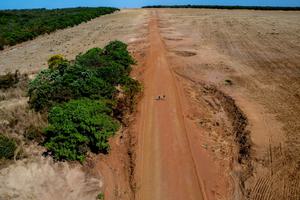"Ghost trees" in Alaska, created when saltwater flooded a coastal forest during an earthquake in 1964. Peter Rintels/Flickr
If nations fail to rein in their greenhouse gas emissions, nearly every terrestrial ecosystem on the planet — from forests to grasslands to marshland —will undergo “major transformations” that will completely change the world’s biomes, warn a team of 42 scientists from around the globe in the journal Science. This will have consequences for everything from food and water security to public health.
“If we allow climate change to go unchecked, the vegetation of this planet is going to look completely different than it does today, and that means a huge risk to the diversity of the planet,” Jonathan Overpeck, dean of the School for Environment and Sustainability at the University of Michigan and co-author of the new study, said in a statement. “We’re talking about global landscape change that is ubiquitous and dramatic. We’re already starting to see it in the United States, as well as around the globe.”
The researchers, led by geoscientist Connor Nolan of the University of Arizona, examined fossilized evidence from nearly 600 locations around the world of how ecosystems changed at the end of the last deglaciation, a period that started about 21,000 years ago and saw warming of 4 to 7 degrees Celsius (7 to 13 degrees Fahrenheit) — comparable to the 4 to 5 degrees C of warming scientists project will occur over the next century or two.
The changes seen during the last deglaciation provide “a conservative estimate of the extent of ecological transformation to which the planet will be committed under future climate scenarios,” the authors wrote.
If emissions continue to rise unabated, the scientists concluded, the probably of large-scale vegetative changes is greater than 60 percent. If nations succeed in meeting their 2015 Paris Agreement greenhouse gas mitigation pledges, the probability of large-scale ecological transformations is less than 45 percent.
“We’re talking about the same amount of change in 10-to-20 thousand years that’s going to be crammed into a century or two,” Stephen T. Jackson, director of the U.S. Geological Survey’s Southwest Climate Adaptation Center and co-author of the new study, said in a statement. “Ecosystems are going to be scrambling to catch up.”



